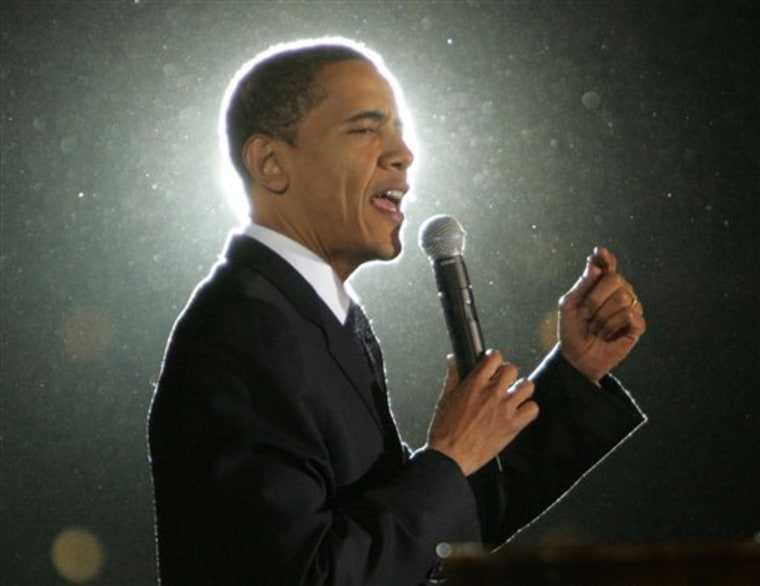Democratic candidate Barack Obama said Thursday the economy is "on the brink of a recession" and blamed economic policies espoused by President Bush and Republican presidential contender John McCain.
Obama mocked a more optimistic economic picture painted by Bush at a White House news conference just moments earlier: "People are struggling in the midst of an economy that George Bush says is not a recession but is experienced differently by folks on the ground."
For the second day in a row, Obama focused on the likely GOP nominee McCain and all but ignored Hillary Rodham Clinton's continuing campaign for the Democratic presidential nomination, although key Democratic primaries come up next Tuesday in Texas and Ohio.
"We are not standing on the brink of recession because of forces beyond our control," Obama told a town hall forum in Austin. "This was not an inevitable part of the business cycle. It was a failure of leadership in Washington — a Washington where George Bush hands out billions of tax cuts to the wealthiest few for eight long years, and John McCain promises to make those same tax cuts permanent, embracing the central principle of the Bush economic program."
'Millions left behind"
In remarks Obama aides suggested were a rebuke to McCain as well as Bush, Obama said more is needed than just "to change faces in the White House," but that the country "needs a change of leadership"
The Illinois senator spoke shortly after Bush told a news conference in Washington that the country is not headed into a recession. While expressing concern about slowing economic growth, Bush rejected for now any additional stimulus efforts.
"We've acted robustly," Bush said. His forecast was rosier than that of many mainstream economists.
Obama offered a sharply different view: "Despite the slogans,we've got millions of Americans that are being left behind."
He said he was "the only candidate in this race to propose a genuine middle-class tax cut." And he added, the nation needs as president a leader who "doesn't defend lobbyists as part of the system, but sees them as part of the problem."
Ignoring Clinton
In focusing on McCain, Obama is pursuing a strategy of acting as if the Democratic nomination were already his. On Wednesday, Obama and McCain sparred by long distance over Iraq.
Unlike Obama, who rarely mentions Clinton by name, Clinton refers to her Democratic opponent often on the campaign trail, both in her formal stump speech and in her casual conversations with voters.
She opened her campaign day Thursday in Pomeroy, Ohio, talking with about 10 people in a mobile home in a heavily rural county where the poverty rate approaches 20 percent.
Health care was at the top of the agenda as she previewed a speech later in the day on child poverty. "There's a lot of people here who don't have health care," said Bryan Holman, one of the residents.
She noted that "my opponent" tells people her health care plan would force people to buy insurance even if they can't afford it and would fine them if they don't. About half the time Clinton refers to Obama by name, the rest as "my opponent."
"That's misleading, that's not at all what's happening," said Clinton.
"I have a plan that would cover everybody, my opponent does not. He would leave 15 million people out. It's like Social Security. Everybody's in Social Security. That's what we have to do with health care."
More economic stimulus
The centerpiece of government efforts to brace the wobbly economy is a package Congress passed and Bush signed last month. It will rush rebates ranging from $300 to $1,200 to millions of people and give tax incentives to businesses. Bush claims no further incentives are needed — and those should be given a chance to work first.
"We can't afford to wait," Obama said in Austin. "News on our economy has not been getting better, it's been getting worse."
Obama has proposed rolling back Bush tax cuts plus a tax credit covering 10 percent of annual mortgage interest payments for "struggling homeowners," a fund for mortgage-fraud victims, aid to state and local governments stung by housing crisis, in $20 billion plan geared to "responsible homeowners."
He would raise income taxes on wealthiest and their capital gains and dividends taxes, raise corporate taxes and give $80 billion in tax breaks mainly for poor workers and elderly.
McCain proposed cutting the corporate tax rate to 25 percent from 35 percent. He would also establish a permanent research and development tax credit and allow tax breaks for equipment and technology investment.
The McCain plan does not contain additional tax relief for individuals beyond previous proposals to repeal the Alternate Minimum Tax, a tax originally designed to fall on the wealthiest but which each year snags more middle-income taxpayers who claim a lot of deductions; and extension of expiring tax cuts from Bush's first term.
Clinton has proposed a 90-day freeze on home foreclosures arising from subprime lending, and a freeze on subprime lending rates, in a $30 billion plan. She would raise income taxes on wealthiest and keep the estate tax on them. She backs higher tax breaks for college. Also, she would tax a portion of health insurance benefits provided to workers making more than $250,000. She proposes a $1 billion paid family leave program to be financed by eliminating some tax shelters.
